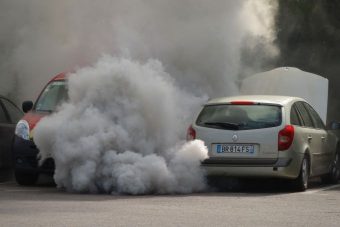
Black carbon found in air pollution can increase the resistance of bacteria that cause respiratory disease, research has found.
The discover could lead to a greater understanding of the effects of air pollution on human health, according to the lead scientist of the University of Leicester study.
The four-year investigation focused on how pollution in the air, which is thought to be responsible for millions of deaths each year, affects bacteria in the nose, throat and lungs of humans.
It found black carbon, produced when diesel, biomass and biofuels are burned, changes the way bacteria grow, possibly affecting their ability to survive and beat human immune systems.
The study concluded that the resistance of communities of Streptococcus pneumoniae – a major cause of respiratory diseases – to penicillin was increased by black carbon. It also caused this pathogen to spread from the nose down the respiratory tract, allowing disease to develop.
Dr Julie Morrissey, the lead author of the paper, said: “This work increases our understanding of how air pollution affects human health. It shows that the bacteria which cause respiratory infections are affected by air pollution, possibly increasing the risk of infection and the effectiveness of antibiotic treatment of these illnesses.
“Our research could initiate an entirely new understanding of how air pollution affects human health. It will lead to enhancement of research to understand how air pollution leads to severe respiratory problems and perturbs the environmental cycles essential for life.”
The university’s Prof Paul Monks, a leading expert on air pollution, said: “The lead investigators have brought together their expertise in genetics, microbiology and air pollution chemistry to provide truly multidisciplinary, ground-breaking insights.
“This research has significant potential to initiate a global research effort to understand a hitherto unknown effect of air pollution and provide significant additional impetus to the control of pollution.”
Source: theguardian.com



